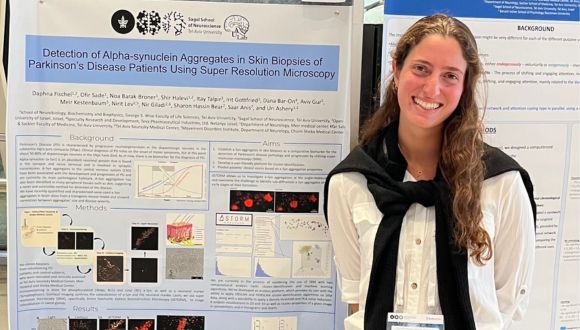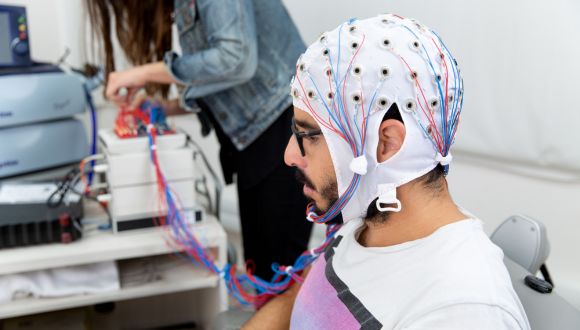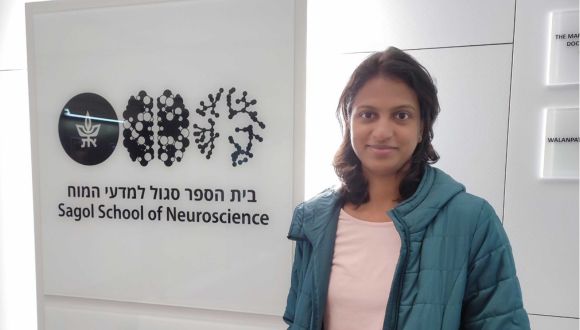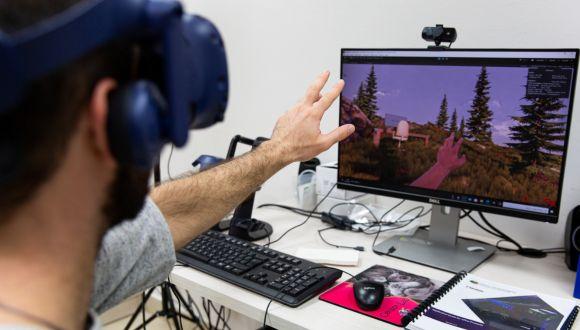Unravel the Mysteries of the Brain with MSc in Neuroscience at TAU's Sagol School
Apply until March 20, 2024
Are you fascinated by the intricacies of the brain, human memory, sleep functions, or attention mechanisms? Perhaps you aspire to contribute to Alzheimer's, Parkinson's, or epilepsy research, delve into decision-making, or develop brain-machine interfaces? The MSc in Neuroscience program at TAU’s Sagol School of Neuroscience allows you to explore these and many other areas.
Diverse Research, Global Impact
In this highly selective graduate program, students actively engage in research from the outset. Collaborating with over 150 labs associated with the Sagol School, students work alongside renowned researchers and benefit from close ties with TAU divisions such as Engineering, Medicine, and Computer Science, as well as various research hospitals.
The program's broad spectrum of research projects is a major draw for international students. Nivedha Mohan Raj, an Indian student, joined TAU after conducting research on early signs of eye dysfunctions at the National Institute of Mental Health and Neurosciences, Bangalore. She became the first international student admitted to the direct Master’s–PhD track of the Neuroscience program. Nivedha now works under Professor Ruth Ashery Padan, studying eye development and the functions of various genes related to eye disorders.
"The labs are amazing. The whole program is very research-focused, and I appreciate the support from my colleagues and the approachability of the lab head." — Nivedha Mohan Raj, second-year MSc student
Daphna Fischel, a recent graduate from the US, focused her research on early detection of Parkinson's disease. "TAU stood out to me because I knew I wanted to be in Professor Uri Ashery's lab," she says. “I always wanted to move to Israel. It's always been home to me, and this felt like the perfect opportunity.”

Daphna Fischel at a poster session. Photo courtesy of Daphna Fischel
In her project, Daphna used super-resolution microscopy to visualize and characterize a-synuclein aggregates in the skin, for use as a potential early biomarker of Parkinson's disease. "The project is ongoing, but we found preliminary evidence of differences in a-synuclein aggregate characteristics, including size, number and density, in control vs. Parkinson's patients."
Prepared for Success: Launching Careers in Neuroscience
The strong research focus ensures that graduates become top-notch neuroscience researchers ready to contribute to academia, research institutions, hospitals, biotech or electronics companies, and other technology-based enterprises.
"After graduation, it is certainly possible to stay in academia with many postdoctoral positions, but a lot of alumni also choose to work in the industry." — Nivedha Mohan Raj
"The program is a great platform to start," remarks Nivedha. "It definitely gives the necessary knowledge and skills to make the choice that suits you best by the end of your studies."

Photo credit: Sagol School of Neuroscience
A Kaleidoscope of Elective Courses
In addition to intensive research, master’s students take a variety of courses chosen from a pool of electives offered by the School and other divisions. With an increasing number of international students, the catalog of English-taught courses is constantly expanding.
Daphna advises students to explore electives that sound interesting: "My favorite course was Sleep and Consciousness with Professor Yuval Nir as it felt like a discussion about topics I vaguely knew but never got to delve deep into. It was unrelated to my research but definitely worth taking."
"I tried to take any elective that sounded fun or interesting, and this is the best advice I would give." — Daphna Fischel, a recent graduate
Nivedha highlights Prof. Inna Slutsky and Dr. Tal Laviv’s course on 'New Aspects of Neuroscience': "All the teachers, including Dr. Tomer Langberg, made the course very engaging. We were reading and discussing recent research papers to learn about modern advances in neuroscience. Such articles are quite often rather difficult to read and it takes time to really understand them, so the course was very useful."
Navigating the Master’s-PhD Track
For those considering the combined Master’s-PhD track, Nivedha recommends taking as many courses as possible during the first year, as research projects that start later require significant time and energy.

Nivedha Mohan Raj, second-year MSc student. Photo credit: The Lowy International School
"I work in the lab every day now, so I have to schedule my courses to make sure I can manage the lab work. I made the right decision to take seven courses in the first year," shares Nivedha.
The Supportive Network at TAU
Both Daphna and Nivedha emphasize the incredible support international students receive from the school and the program coordinator, Mrs. Orly Segev, who is always ready to help, fostering an incredible feeling of welcome at Tel Aviv University.
"I had a great experience in the program. I had plenty of classes to choose from and met a lot of wonderful people," — Daphna Fischel.
The program is fully funded and successful applicants are entitled to a monthly scholarship.
Admissions to the program are open until March 20, 2024.
Contact program coordinator Orly Segev for more information on the program and the application process at Sagolmsc@tauex.tau.ac.il





